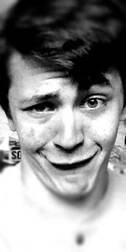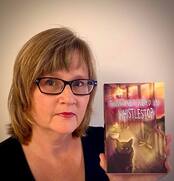Sacred Chickens
Menu
SACRED CHICKENS
 Chapter 1 The Thin Hungry Man Has an Idea ...and it Hurts By Julie Carpenter The Thin Hungry Man is on the move again...before we catch up with him, let's go back and see how he got into this mess in the first place. Once upon a time in a deep, dark forest far, far away, a very tall and incredibly thin man was hiking through a large and beautiful forest. He was very thin because he had no food. He had no food because there was not even one grocery store in the whole forest. However, he never managed to die because he was, in fact, only a storybook man and not a real man at all. In story books, of course, death does not come for the asking or the wishing; it comes at the will of the author. This thin storybook man suffered only from the incredible thinness mentioned above, and of course, a more incredible hunger, all because the author who had created him didn’t allow him to die and because she hadn't included a grocery (or even a mini-mart) of any kind in the forest. The most heartbreaking part of all was that the poor man didn't even realize that there was no such thing as food in the forest, and so he kept hiking endlessly in the hope that eventually he would find food. Perhaps the author was really no good at all at characterization; at any rate she had given the poor man very little in the way of sense or knowledge before abandoning the story, which now resided in a red paper folder inadvertently tossed under her couch. With his precarious world unlikely to be disturbed, the Thin Hungry Man was trapped in a plot which was unlikely to be resolved. It could be said that the only real sense or knowledge that the Thin Hungry Man had was of a lack; his only drive was the gnawing hunger. This hunger formed all there was of his character; it was his only gift. The rest of the creation, if one surveyed it, seemed perfect. The forest was absolutely ideal. It was lush and beautiful, a virgin forest- completely peaceful except for the confused wanderings of the Thin Hungry Man. The trees were widely spaced and their branches and leaves laced themselves together over most of the forest, leaving the sunlight to filter through a canopy of emerald with fragments of gold flickering here and there and beautiful clearings filled with warm, clear light. One of these clearings contained a lovely little pond in the very middle of it, with a few darting silvery fish playing in the clear, clear water. There were birds and squirrels frolicking in the awning of trees. There were rabbits skipping about on the green floor of the forest. Snakes and bears and lions were never to be seen. It might have come from a fairy tale such a lovely scene it was, not too original perhaps but enticing nonetheless, and nicely done in its way. However, the land outside the forest appeared to be a huge void of nothingness. It was as if the author had had no idea what to do with it, or perhaps she simply had not done anything with it yet, or perhaps there was a reason for the existence or non-existences of the nothing. But to the Thin Hungry Man it was the wall that formed his prison. The Thin Hungry Man wandered through the beauty day after lonely day with no thought of anything but his hunger. He did not ponder the reasons that he seemed to be surrounded by nothing. He did not curse the hand that had created him. He simply searched night and day for something that would cure the ache in his belly. And so the Thin Hungry Man found himself alone, utterly and completely alone in his world, not that he'd ever known himself to be otherwise. The absence of his creator made little difference in his paltry life. It went on much as it had before in an endless and meaningless search for food. Of course, his search would have been made easier by far had he had a better idea what it was he was looking for. He had a vague and distant idea about food. He somehow knew that there was in existence something that would stop the pain in his middle. Unfortunately, nothing that he found in the forest seemed to match his half-formed ideas of food. His brain couldn't seem to pull his fibrous, hand-me-down thoughts together in any kind of coherent pattern. They swirled about bumping into one another and scattering, holding out the promise of food without making clear the actions to be taken. Still he clung quite fiercely to that tiny shimmering hope. It was indeed a marvelous feat of emotional will, to be accomplished by someone so ignorant and weak as himself. So each day at sunrise he once more got up and, weary and hungry though he was, traversed the forest in search of breakfast, and quite sadly continued the search through lunch and dinner. Many times in his quest he had come upon the little pond, and sometimes on those occasions he sat in front of it for a time and looked at himself reflected in the water. Each time he noticed his reflection in the water, a multitude of half-formed thoughts came rushing in upon the image, and he always sat very still, hoping to capture one and decipher its meaning. That image of himself, himself and not himself, had given him a vague and curious wondering about otherness. Had he not been so hungry it might have been a more absorbing interest. There were many fish, all as alike as possible, and yet separate. The only other thing like himself that he had seen was this shivering green and gold image in the water. And since he couldn’t see himself very well, even that was conjecture. But the image in the water had hands, like his hands, and moved when he moved. This was a poor reflection of the partnered dance of the many fish, flickering and flashing one behind the other, now reflecting, now opposing each other's movements. He didn't sit pondering these things for very long though. He was too hungry. The thought of eating his forest companions did not occur to him and he had no one to teach him how to hunt or gather food. And he might have been hard pressed in his weakened state to catch any of the quick happy creatures in the forest. He had once tried grass like the rabbits but it did nothing to stop the pain. The search for food went on and on. Considering that it was happening inside the pages of a story and not in reality as non-fictional people experience it, there is no way to assess exactly how long that was. To the sad man trapped in the reality of the incessant hunger it must have seemed just one second short of eternity. It could have indeed been endless, had it not been for a rather unexpected turn of events. One day, as always, he was hiking through the forest in search of food, when suddenly it came to him. He realized that there was no food in the forest. The thought struck him so hard that he fell down. It was the first time that a fully formed idea had presented itself to him. But it was not the thought itself, as much as the extremely disconcerting nature of the idea that affected him in this way. The thought that there was simply nothing in the forest that matched his poor ideas of food was too much. He realized that there was no longer any point in his one ritual, the daily search for sustenance. He lay on the ground and cried. He cried until darkness came and the moon rose in its shimmering, distant beauty and put him uneasily to sleep. And so his first real thought was not a happy one. It was only a knowledge of the deficiency of his world. He knew beyond a shadow of a doubt that he would never find what he must have. When the Thin, Hungry Man woke up the next morning he jumped up ready to start his search once more, and then he realized. There was no more need to search. This fact abruptly deprived his life of all meaning. He suddenly found himself facing questions, questions that were very difficult for a hungry, weak brain on the morning after the world has fallen apart. If there was no food to be found in the forest, where did one look for food? The edge of the forest seemed to be the edge of everything. He could not see beyond its border. Of course, nothing existed outside the forest, so there was nothing to see. Escaping the forest seemed impossible. He thought about it for a while. He got up. There seemed to be nothing left to do. He was altogether tired of being hungry. He looked at the forest around him. It had appeared much more pleasant when he had believed there might be food in it. He began walking. He was walking very fast. He had made up his mind. It wasn't a good mind for making plans but he had come up with a rather desperate one. He walked until he came to the edge of the forest. He looked, or tried to look, beyond the trees. Considering the fact that nothing is not easy to see nor is it easy to make sense of, what the man did next was fairly remarkable. He took a running start and leapt into it.  Bio: Julie Carpenter is the creator of the Sacred Chickens website and Author of Things Get Weird in Whistlestop. She is dedicated to telling stories and making sure that indie writers and publishers have a way to be heard. She uses narrative, her own and others’, to help interpret the world. She has a Master of Professional Writing from the University of Memphis, with an emphasis in Composition Theory. She wants to bend reality one story at a time. Julie’s work has appeared in Fiction on the Web and will be included The New Guard. She is currently working on a novel and starting a podcast where people can tell her about their weird ideas.
0 Comments
Leave a Reply. |

Click Photo above to buy ebook or paperback from Amazon.
Here's the link to Barnes and Noble Or order through your favorite independent bookstore! Categories
All
|
 RSS Feed
RSS Feed